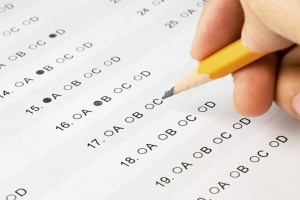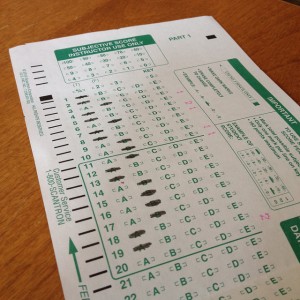“Taking the L”

Senior Kathrine Groh takes a test in AP Calc
“It’s fine, I’m just going to take the L on this test.”
Although some adults may not understand this phrase, it is becoming increasingly popular throughout the classrooms of Apple Valley High School. I would venture to say every high school student at AVHS has heard it before; I may even go as far as to say at least 70 percent of students have said it themselves.
I know I have.
From freshmen to seniors, this phrase does not discriminate by age, gender, race, or endoftheyearitis–everyone is willing to “take the loss.”
“It seems like everyday someone is saying it,” said honors chemistry teacher Mrs. Lee. “I feel like this year I am seeing this more often than I have in the past.”
The origins of this phrase are pretty unclear. Urban Dictionary’s definition is dated back to 2007, but for AVHS, it feels like a fairly new phenomenon.
“I say it because that way if I do poorly on a test, I don’t feel as bad because I prepared myself going in, and if I do well, then I feel even better,” said junior Kylie Maxfield.
But do students really know how great that loss truly is?
According to a study done by the University of Toronto in 2009, when people are in a negative mindset or a bad mood, they take in less information than those in an optimistic/positive mood. This means that thinking you are going to do poorly on a test results in tunnel vision, making everything you need to remember for the test much more difficult.
Most tests in high school are going to be hard; now I say most only because everyone has to take a Wellness 1 test, and it is much easier to prepare yourself for failure if going in you tell yourself that is what is going to happen. But, in the end that mindset hurts you.
Instead, here’s what you can do to help stop this from happening:
Stop saying “take the L”
Whether said in your head or out loud, your brain loses faith in your abilities. Low self-esteem results in worse test scores, according to a study published the US National Liberty of Medicine National Institutes of Health. Meaning as soon as you stop believing in yourself, your brain believes it too.
Write down three concrete things you are good at
It does not have to be calculus, but maybe you are really good at racquetball–whatever it is,write it down. This puts your brain in a positive mindset before your test, making you feel more confident and comfortable during the test.
Skip it and come back
If there is something you don’t remember or know, circle it and move on. Staying on one question that is really hard makes you lose confidence for the rest of the test. The more you second-guess yourself, the worse you do.
Reward yourself
For every assignment you finish, or notecard you make, or hour of studying you do, reward yourself. It can either be food, or 15 minutes or your phone if you want instant gratification. Or rely on Intrinsic motivation. This means that you are internally rewarding yourself because you know that if you do well you could get into a better college or be more successful in the future.
Don’t waste your time
Instead of thinking about all of the things you haven’t done and stressing yourself out, make positive steps to accomplish your tasks. A survey done by the University of Cape Town found that when students spend time worrying, they spend more time avoiding the issue, which only perpetuates the problem.
Don’t base your worth on a grade, base it on who you are
A study done by the University of Michigan found that around 80 percent of students surveyed responded that their self-esteem was based on how they do in school. This leads to worse health conditions, which can also harm your schoolwork. If you base it instead on what kind of person you are, then you have complete control over the outcome, instead of letting someone else decide for you.
Confidence is key
No matter what, as soon as you sit down to take a test, there is nothing more you can do. So, stop spending time thinking about the what-ifs and believe that you did everything you could to prepare yourself. All anyone can ever do is their best, believe that your best is good enough.
In the end, everyone will fail a test sometime in his or her life–it is inevitable. But that does not mean that going into every difficult final exam or in-class essay you have to tell yourself you are going to “take the L.” Doing so makes it more likely that you are going to fail. Instead, follow these helpful tips that work with the science behind your brain.
“It’s fine, I’m just going to take the W on this test.”










Graden Hill • Apr 27, 2016 at 4:07 pm
Avoiding homework right now by reading this lol